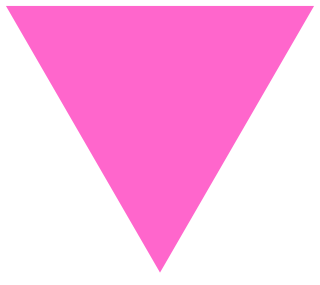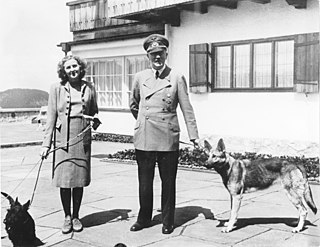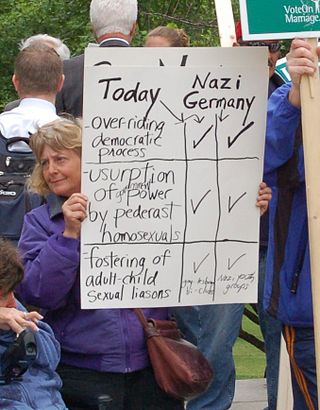
Lesbian, gay, bisexual, transgender and queer (LGBTQ) movements are social movements that advocate for LGBTQ people in society. Although there is not a primary or an overarching central organization that represents all LGBTQ people and their interests, numerous LGBTQ rights organizations are active worldwide. The first organization to promote LGBTQ rights was the Scientific-Humanitarian Committee, founded in 1897 in Berlin.
Conversion therapy is the pseudoscientific practice of attempting to change an individual's sexual orientation, gender identity, or gender expression to align with heterosexual and cisgender norms. Methods that have been used to this end include forms of brain surgery, surgical or hormonal castration, aversive treatments such as electric shocks, nausea-inducing drugs, hypnosis, counseling, spiritual interventions, visualization, psychoanalysis, and arousal reconditioning.
The Sturmabteilung was the original paramilitary wing of the Nazi Party. It played a significant role in Adolf Hitler's rise to power in the 1920s and early 1930s. Its primary purposes were providing protection for Nazi rallies and assemblies, disrupting the meetings of opposing parties, fighting against the paramilitary units of the opposing parties, especially the Roter Frontkämpferbund of the Communist Party of Germany (KPD) and the Reichsbanner Schwarz-Rot-Gold of the Social Democratic Party of Germany (SPD), and intimidating Romani, trade unionists, and especially Jews.

A pink triangle has been a symbol for the LGBT community, initially intended as a badge of shame, but later reappropriated as a positive symbol of self-identity. In Nazi Germany in the 1930s and 1940s, it began as one of the Nazi concentration camp badges, distinguishing those imprisoned because they had been identified by authorities as gay men or trans women. In the 1970s, it was revived as a symbol of protest against homophobia, and has since been adopted by the larger LGBT community as a popular symbol of LGBT pride and the LGBT movements and queer liberation movements.
Anti-LGBTQ rhetoric comprises themes, catchphrases, and slogans that have been used in order to demean lesbian, gay, bisexual, transgender and queer (LGBTQ) people. They range from the demeaning and the pejorative to expressions of hostility towards homosexuality which are based on religious, medical, or moral grounds. It is widely considered a form of hate speech, which is illegal in countries such as the Netherlands, Norway, and Sweden.

Paul Edward Gottfried is an American paleoconservative political philosopher, historian, and writer. He is a former Professor of Humanities at Elizabethtown College in Pennsylvania. He is editor-in-chief of the paleoconservative magazine Chronicles. He is an associated scholar at the Mises Institute, a libertarian think tank, and the US correspondent of Nouvelle École, a Nouvelle Droite journal.

Opposition to legal rights for lesbian, gay, bisexual, transgender and queer (LGBTQ) people exists throughout the world. LGBTQ rights opponents may be opposed to the decriminalization of homosexuality; laws permitting civil unions or partnerships or supporting LGBT parenting and adoption, LGBT military members, access to assisted reproductive technology, and access to gender-affirming surgery and gender-affirming hormone therapy for transgender individuals.

Claudia Ann Koonz is an American historian of Nazi Germany. Koonz's critique of the role of women during the Nazi era, from a feminist perspective, has become a subject of much debate and research in itself. She is a recipient of the PEN New England Award, and a National Book Award finalist. Koonz has appeared on the podcasts Holocaust, hosted by University of California Television, and Real Dictators, hosted by Paul McGann. In the months before the 2020 United States presidential election, Koonz wrote about the risks of autocracy in the United States for History News Network and the New School's Public Seminar.

Edmund Heines was a German Nazi politician and Deputy to Ernst Röhm, the Stabschef of the Sturmabteilung (SA). Heines was one of the earliest members of the Nazi Party and a leading member of the SA in Munich, participating in the Beer Hall Putsch and becoming a notorious enforcer of the party. He held several high-ranking positions in the Nazi administration until he was executed during the Night of the Long Knives in June 1934.

The Pink Swastika: Homosexuality in the Nazi Party is a 1995 pseudohistorical book by Scott Lively and Kevin Abrams. Drawing on Samuel Igra's 1945 book Germany's National Vice, Lively and Abrams argue that the crimes committed by homosexuals in the Nazi Party exceed the persecution of homosexuals in Nazi Germany and that homosexuality contributed to the extreme militarism of Nazi Germany. They contend that only feminine homosexuals were persecuted by the Nazis, while "butch" homosexuals formed the leadership cadre of the Nazi party. Historian Andrew Wackerfuss criticized the book for lack of accuracy and "outright homophobic charges". The claim advanced by Igra, Lively, and Abrams that homosexuals were responsible for Nazi atrocities is rejected by most historians.

The sexuality of Adolf Hitler, dictator of Germany from 1933 to 1945, has long been a matter of historical and scholarly debate, as well as speculation and rumour. There is evidence that he had relationships with a number of women during his lifetime, as well as evidence of his antipathy to homosexuality, and no evidence of homosexual encounters. His name has been linked to a number of possible female lovers, two of whom committed suicide. A third died of complications eight years after a suicide attempt, and a fourth also attempted suicide.
Harrington Park Press (HPP) is an academic/scholarly book publisher based in New York City, specializing in LGBTQ topics such as diversity, inclusivity, and equality.
Christian denominations have a variety of beliefs about sexual orientation, including beliefs about same-sex sexual practices and asexuality. Denominations differ in the way they treat lesbian, bisexual, and gay people; variously, such people may be barred from membership, accepted as laity, or ordained as clergy, depending on the denomination. As asexuality is relatively new to public discourse, few Christian denominations discuss it. Asexuality may be considered the lack of a sexual orientation, or one of the four variations thereof, alongside heterosexuality, homosexuality, bisexuality, and pansexuality.
German individualist philosopher Max Stirner became an important early influence in anarchism. Afterwards Johann Most became an important anarchist propagandist in both Germany and in the United States. In the late 19th century and early 20th century there appeared individualist anarchists influenced by Stirner such as John Henry Mackay, Adolf Brand and Anselm Ruest and Mynona.

The Brown Book of the Reichstag Fire and Hitler Terror is a book published in Paris, France in August 1933. It was written by an anti-fascist group which included German communist Willi Munzenberg, as well as Hans Siemsen and Gustav Regler. It put forth the theory that Nazis were behind the Reichstag fire of February 27, 1933. According to Spanish novelist Antonio Muñoz Molina it was one of the best selling books of all time.

"They Can Live in the Desert but Nowhere Else": A History of the Armenian Genocide is a book by Ronald Grigor Suny about the Armenian genocide, published by Princeton University Press in 2015. The book was praised as an accessible work that provides the academic consensus on why and how the Armenian genocide occurred.

There is a widespread and long-lasting myth alleging that homosexuals were numerous and prominent as a group in the Nazi Party or the identification of Nazism with homosexuality more generally. It has been promoted by various individuals and groups from before World War II through the present, especially by left-wing Germans during the Nazi era and the Christian right in the United States more recently. Although some gay men joined the Nazi Party, there is no evidence that they were overrepresented. The Nazis harshly criticized homosexuality and severely persecuted gay men, going as far as murdering them en masse. Therefore, historians regard the myth as having no merit.

A World Without Jews: The Nazi Imagination from Persecution to Genocide is a 2014 book by Alon Confino published by Yale University Press, which seeks to explain Nazi antisemitism and the Holocaust by looking into the imaginations and fantasies of Nazis. It received mixed reviews in scholarly and popular publications. Some reviewers praised Confino's analysis for its originality, while others criticize it for making assertions that are not sufficiently backed by evidence.
Laurie Marhoefer is a historian of queer and trans politics who is employed as the Jon Bridgman Endowed Professor of History at the University of Washington. In January 2021, together with Jennifer V. Evans, they facilitated the Jack and Anita Hess Research Seminar at the United States Holocaust Memorial Museum on LGBTQ+ histories of the Holocaust.

The Röhm scandal resulted from the public disclosure of Nazi politician Ernst Röhm's homosexuality by anti-Nazis in 1931 and 1932. As a result of the scandal, Röhm became the first known homosexual politician.













